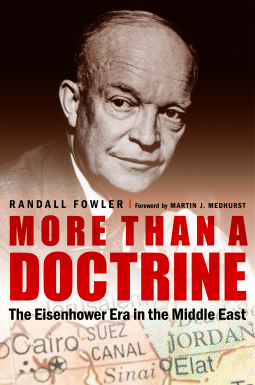
More Than a Doctrine
The Eisenhower Era in the Middle East
by Randall Fowler
This title was previously available on NetGalley and is now archived.
Send NetGalley books directly to your Kindle or Kindle app
1
To read on a Kindle or Kindle app, please add kindle@netgalley.com as an approved email address to receive files in your Amazon account. Click here for step-by-step instructions.
2
Also find your Kindle email address within your Amazon account, and enter it here.
Pub Date May 01 2018 | Archive Date May 14 2018
University of Nebraska Press | Potomac Books
Talking about this book? Use #MoreThanAdoctrine #NetGalley. More hashtag tips!
Description
How did Eisenhower justify this intervention to an American public wary of foreign entanglements? Why did he boldly issue the doctrine that bears his name? And, most important, how has Eisenhower’s rhetoric continued to influence American policy and perception of the Middle East? Randall Fowler answers these questions and more in More Than a Doctrine. With the expansion of America’s global influence and the executive branch’s power, presidential rhetoric has become an increasingly important tool in U.S. foreign policy—nowhere more so than in the Middle East. By examining Eisenhower’s rhetoric, More Than a Doctrine explores how the argumentative origins of the Eisenhower Doctrine Address continue to impact us today.
Advance Praise
“Randall Fowler’s timely and provocative book addresses an important and enduring question: How did Americans come to see the Middle East as an area of vital U.S. interest? . . . Grounded in the most important case studies of the 1950s, More Than a Doctrine illuminates the long-term significance of this critical turning point in American globalism, which set the stage for decades of regional entanglement.”—Kenneth Osgood, author of Total Cold War: Eisenhower’s Secret Propaganda Battle at Home and Abroad
“Deeply researched and cogently argued. . . . This study could not come at a more appropriate time.”—Jerry M. Long, associate professor in the Honors College and director of Middle East Studies at Baylor University and author of Saddam’s War of Words: Politics, Religion, and the Iraqi Invasion of Kuwait
“Fowler reveals the ways that future presidents were heirs of Eisenhower’s political precedents and rhetorical warrants that normalized U.S. interventionism as its dominant foreign policy in this war-torn region of the world.”—Shawn J. Parry-Giles, professor of communication at the University of Maryland and author of The Rhetorical Presidency, Propaganda, and the Cold War, 1945–1955
Available Editions
| EDITION | Other Format |
| ISBN | 9781612349978 |
| PRICE | $39.95 (USD) |
| PAGES | 272 |
Links
Featured Reviews
It is widely believed that president Eisenhower was a boring non-entity. That he was continually playing golf, letting others deal with the day to day management of the country. It was believed that he was inept and knew little about foreign policy. This book seeks to rectify that belief.
This book analyses the Speeches given by Eisenhower, looking at the rhetorical devices used by the president to move public opinion his way and to move the country to a more interventionist Stance, especially when it came to the ‘Middle East’. It showed how he often allowed other people to speak, hiding his own very active involvement in the world behind the actions of others. Moreover, the work highlights the way that America sought to hide their involvement in the gulf region by placing countries, such as the United Kingdom, in visible positions, using these countries to cover America’s increasing power within the Middle East.
This book has an academic feel with close and dense analysis of texts. This may inhibit the general reader. But, this very well written book is well worth a read.



